Elders in Residence embedding Aboriginal knowledges and cultures at UniSA
By Dan Lander
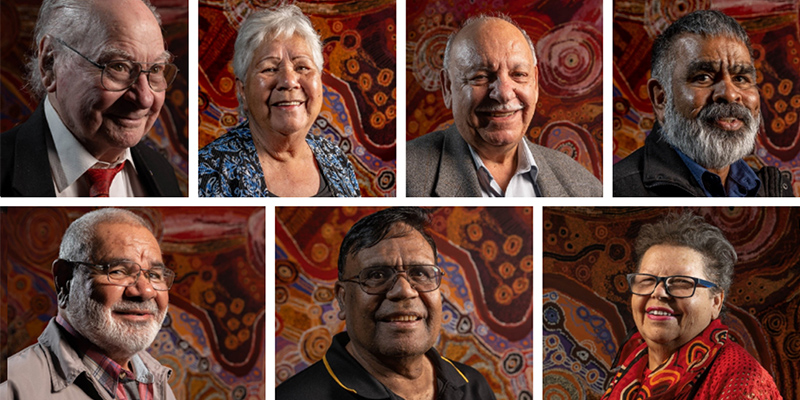 COMMUNITY The members of Purkarninthi: (L-R top) Uncle Lewis O’Brien, Aunty Roslyn Weetra, Uncle David Rathman, Uncle Frank Wanganeen, (bottom) Uncle Kevin (Dookie) O’Loughlin, Uncle Kym Kropinyeri and Aunty Lynette Crocker.
COMMUNITY The members of Purkarninthi: (L-R top) Uncle Lewis O’Brien, Aunty Roslyn Weetra, Uncle David Rathman, Uncle Frank Wanganeen, (bottom) Uncle Kevin (Dookie) O’Loughlin, Uncle Kym Kropinyeri and Aunty Lynette Crocker.Not pictured: Aunty Lucy Waniwa Lester. Photos courtesy Nharla Photography
People who identify as Aboriginal or Torres Strait Islander should be advised that this webpage contains a name of, and quote by, a deceased person. Seeing a name of a deceased may be upsetting or distressing in some Aboriginal and Torres Strait Islander communities, and in some situations, offend against strongly held cultural prohibitions.
As UniSA prepares for various events and engagements as part of 2021’s National Reconciliation Week (27 May to 3 June), the University is fortunate to be able to call on the guidance of eight senior Aboriginal Elders who together form the University’s Elders in Residence (EiR) program.
Now known by its Kaurna name, Purkarninthi – which means ‘becoming an Elder’ – the program is a deliverable of the Stretch Reconciliation Action Plan (2018 to 2021), designed to support Aboriginal learning across the University and support to students.
The Purkarninthi group consists of eight metropolitan Elders who have kinship ties across South Australia, with two members holding honorary degrees from UniSA. All are well known and widely respected for their broad range of community and cultural knowledge and leadership.
Pro Vice Chancellor: Aboriginal Leadership and Strategy, Professor Irene Watson, says EiR programs play a critical role in embedding Aboriginal knowledges and cultures within universities and they are an important mechanism for engaging with Aboriginal peoples on an ongoing basis.
“Feedback received from Elders, community members and current UniSA Aboriginal students is that the University could engage more with Elders in the delivery of support services to students,” Prof Watson says.
“An EiR Program helps develop and grow relationships between local Elders, students and the University, which will form the nucleus of the proposed Aboriginal Knowledges Centre, a hub for collaboration around two-way knowledge.
“It also provides opportunities for Elders to share their knowledge with all UniSA staff and students and enables the positive contributions Elders make to daily life on campus.”
UniSA is unique in the Australian higher education sector as its founding legislation includes functions to meet the needs of Aboriginal people. UniSA aims to be a university of choice for Aboriginal people and was the first institution in South Australia to issue a statement of reconciliation.
Similar EiR programs have been very successful in other universities nationally, such as the Elders on Campus at Western Sydney University, and many have grown strong, dedicated Elders groups who are a great support, providing crucial mentoring and cultural leadership for Aboriginal students.
“Elders hold a wealth of knowledge and experience, and UniSA has developed several important relationships with Elders since its inception,” Prof Watson says.
“Formalising these relationships with the establishment of an Elders in Residence program appropriately acknowledges and values these existing relationships and recognises the Elders’ time and expertise.
“Fostering these relationships between Elders and students is a mechanism by which UniSA can continue to expand and customise the support available to Aboriginal students, which is a key deliverable identified within the UniSA Reconciliation Action Plan. It also supports the action within the RAP to develop a peer-support network for Aboriginal students.”
The Purkarninthi Elders had all been closely involved with UniSA when they were approached to be involved in the development of the EiR program and will remain part of the program for as long as they are able and willing, contributing to a wide range of UniSA activities.
“Elders have contributed expertise and knowledge across key areas of UniSA research, including intellectual property, the revision of AIATSIS guidelines for ethical research consultation draft, and the Aboriginal Research Strategy,” Prof Watson says.
“Elders have considered and given advice on language, culture, education and critical matters of protocol, including confirmation of Aboriginality. They have provided advice and recommendations on matters including dual naming of UniSA buildings, proper protocols, scholarships, Aboriginal content in programs, and student retention.”
For further information about Purkarninthi, please contact Colleen Clarke, project officer to the Pro Vice Chancellor: Aboriginal Strategy and Leadership.
The members of Purkarninthi are:
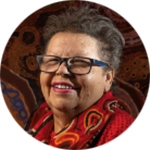
Aunty Lynette Crocker – Kaurna Elder
Aunty Lynette is a Ngangki Burka, Senior Kaurna Woman, and she has served on a wide range of community and local government committees for Aboriginal affairs. She has helped develop Reconciliation Action Plans for the Campbelltown, Adelaide, and Marion City Councils.
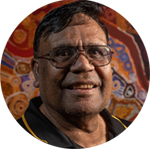
Uncle Kym Kropinyeri – Ngarrindjeri Elder
Uncle Kym is a Ngarrindjeri man born at Point McLeay Mission, currently working on writing the autobiography of his renowned uncle, David Unaipon, with whom he lived as a child. He has an extensive knowledge of Ngarrindjeri culture and has been painting for more than 40 years.
Aunty Lucy Waniwa Lester – Yankunytjatjara Elder
Aunty Lucy is a linguist, teacher, cultural educator, and translator. She has been artist since an early age, and her work featured in the book Our Mob, God's Story, which tells Old and New Testament stories through the eyes of Aboriginal Australians.
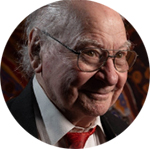
Uncle Lewis O’Brien – Kaurna Elder
Dr Uncle Lewis is a senior Kaurna Elder, educator, advisor, counsellor, and a writer and speaker of the Kaurna language. He has been an Adjunct Research Fellow at UniSA since 2006, holds honours including Officer of the Order of Australia Medal, and is widely regarded as a leader of reconciliation.
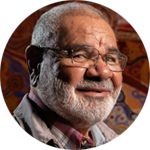
Uncle Kevin (Dookie) O’Loughlin – Narungga and Kaurna Elder
Uncle Dookie grew up at Point Pearce Mission on the Yorke Peninsula, and is a storyteller, cultural consultant, and a champion for cultural understanding and valuing of Aboriginal knowledges. He has received many awards, including a 2006 Order of Australia and NAIDOC Scholar of the Year in 1993.
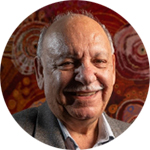
Uncle David Rathman – Arrernte Elder
Uncle David serves on the Aboriginal Legal Rights Movement Board, is Chair of the Aboriginal Advisory Committee and was recently appointed Ambassador for the Aboriginal Art and Cultures Centre (AACC) now in development at Lot Fourteen. He is a Member of the Order of Australia.
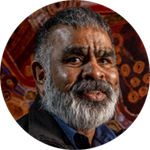
Uncle Frank Wanganeen – Kaurna and Narungga Elder
Uncle Frank is the current Chair of the Salisbury Council Reconciliation Committee. He also operates the Kaurna Cultural Walking Tours in the Adelaide CBD and describes himself as a cultural educator who creates awareness of Kaurna cultural heritage and Aboriginal issues.
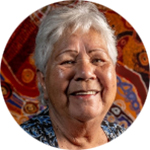
Aunty Roslyn Weetra – Narungga, Ngadjuri, Arrernte and Kaurna Elder
Aunty Roslyn has worked as an Aboriginal liaison person for state and Commonwealth departments and Aboriginal organisations. She has held the role of ATSIC Commissioner and positions on numerous boards, groups, and committees, including the Ngadjuri Nations Native Title Board.
Other Stories
- More sleep or more exercise: the best time trade-offs for children’s health
- Espresso, latte or decaf? Genetic code drives your desire for coffee
- More flexibility for students through plan to bring together research and teaching
- Industry goes ‘nuts’ for world-first almond grading machine
- From the Vice Chancellor
- Achievements and Announcements
- UniSA makes healthy choices easier for staff and students
- Graduate puts second chance education in focus
- Three decades at UniSA: staff member proves she’s ‘unstoppable’
- Researcher calls for change to dominant view of 'good mothering'
- Elders in Residence embedding Aboriginal knowledges and cultures at UniSA
- Bradley Building dedicated in celebration of champion of education
- Australian-first partnership helps veterans harness their health through sport
- The latest books from UniSA researchers
- In Pictures: UniSA graduations, Bradley Building dedication & school sport



